Crafting mind-enhancing herbal tea blends at home is a rewarding way to boost your cognitive function naturally. You'll need essential herbs like ginkgo biloba, bacopa, rosemary, and gotu kola. Start with simple blends like ginkgo and rosemary or peppermint and gotu kola. Use high-quality loose-leaf herbs and master steeping times for ideal potency. Store your blends in airtight glass containers away from light and moisture. Incorporate your teas into daily routines for maximum benefit, and always consult a healthcare professional before starting new herbal regimens. With the right knowledge and ingredients, you'll be well on your way to creating powerful, brain-boosting brews.
Benefits of Mind-Enhancing Herbal Teas
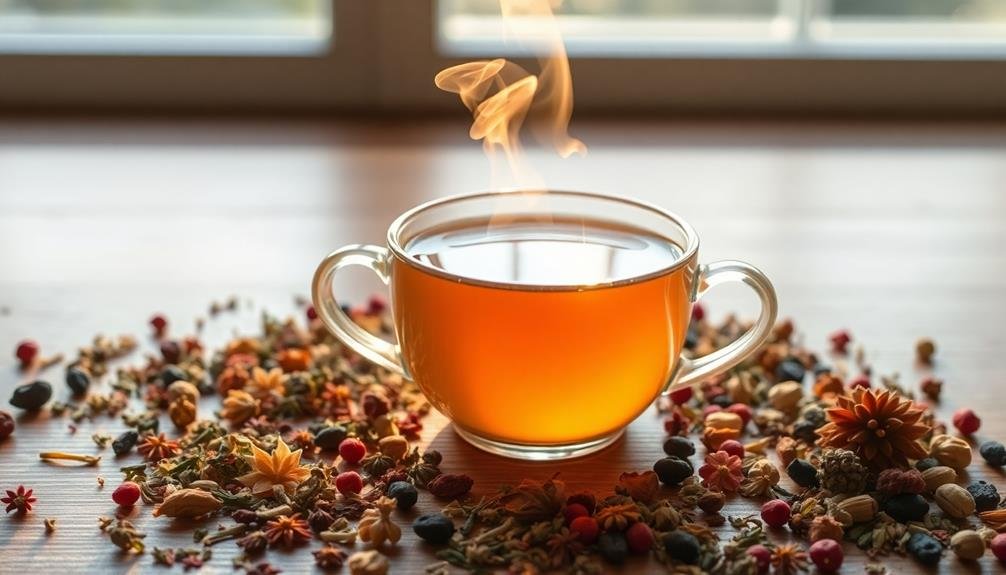
Frequently overlooked, mind-enhancing herbal teas offer a natural way to boost cognitive function and mental clarity. These teas contain powerful herbs that can improve your focus, memory, and overall brain health. By incorporating them into your daily routine, you'll experience enhanced mental performance and reduced stress levels.
Many mind-enhancing herbs, like ginkgo biloba and bacopa monnieri, have been shown to increase blood flow to the brain, improving oxygen and nutrient delivery. This can lead to better concentration and faster information processing.
Other herbs, such as rosemary and peppermint, contain compounds that stimulate neurotransmitter activity, potentially enhancing mood and cognitive function.
You'll also benefit from the antioxidants found in these teas, which protect your brain cells from oxidative stress and age-related decline. Some herbs, like lion's mane mushroom, may even promote the growth of new neural connections, supporting long-term brain health.
Additionally, the ritual of preparing and sipping tea can be a mindful practice, helping you reduce anxiety and improve mental well-being. By choosing the right blend of mind-enhancing herbs, you're investing in your cognitive health and overall mental performance.
Essential Herbs for Cognitive Function
Now that we've explored the benefits of mind-enhancing teas, let's focus on specific herbs that can boost your cognitive function.
These powerful botanicals have been used for centuries to support mental clarity, memory, and focus. When crafting your own herbal tea blends, consider incorporating these essential herbs:
- Ginkgo Biloba: Improves blood flow to the brain, enhancing memory and concentration
- Bacopa Monnieri: Supports memory formation and reduces anxiety
- Rosemary: Increases alertness and improves long-term memory
- Gotu Kola: Enhances mental clarity and reduces fatigue
- Lion's Mane Mushroom: Stimulates nerve growth factor production, supporting brain health
You'll want to experiment with different combinations to find the blend that works best for you.
Start with small amounts of each herb and gradually increase as needed. Remember, these herbs can interact with medications, so it's vital to consult your healthcare provider before adding them to your routine.
When brewing your cognitive-enhancing tea, steep the herbs in hot water for 5-10 minutes to extract their beneficial compounds.
Enjoy your custom blend daily to experience the full cognitive benefits of these powerful herbs.
Gathering Your Tea-Making Supplies
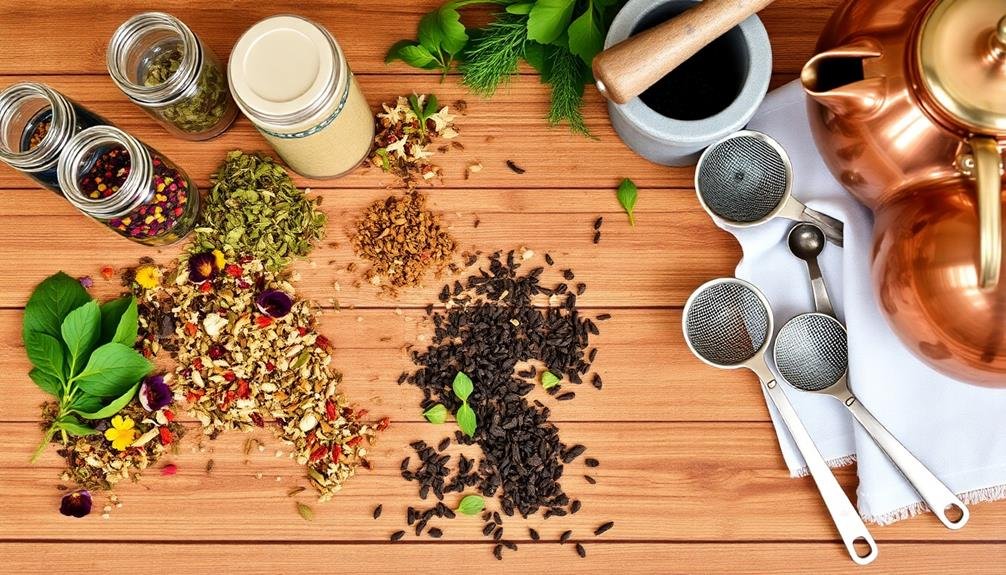
Before you plunge into creating your own herbal tea blends, it's vital to gather the right supplies. Start with a selection of high-quality, organic herbs in dried form. You'll need a reliable scale to measure ingredients accurately, typically in grams.
Invest in airtight storage containers to keep your herbs fresh and potent. For brewing, acquire a teapot with a built-in infuser or separate mesh tea balls. A thermometer is fundamental for achieving the ideal water temperature for different herbs. Don't forget a timer to guarantee precise steeping times.
You'll also need tools for blending and handling herbs, such as a mortar and pestle for crushing larger pieces, and small spoons or scoops for measuring. Consider getting a notebook to record your recipes and tasting notes.
For packaging your blends, stock up on tea bags or filters, along with labels and markers. A small funnel can help transfer your mixtures into storage containers or bags.
Ginkgo Biloba and Rosemary Blend
A powerful blend for cognitive enhancement combines ginkgo biloba and rosemary.
These two herbs work synergistically to boost mental clarity, improve memory, and enhance overall brain function. Ginkgo biloba, known for its circulation-boosting properties, increases blood flow to the brain, while rosemary contains compounds that support neurotransmitter activity.
To create this mind-enhancing blend, you'll need:
- 2 parts dried ginkgo biloba leaves
- 1 part dried rosemary leaves
- 1 part dried peppermint leaves (optional, for flavor)
- 1 teaspoon honey (optional, for sweetness)
- Strainer or tea infuser
Mix the dried herbs in a bowl, then store in an airtight container.
To brew, use 1 teaspoon of the blend per cup of hot water. Steep for 5-7 minutes, strain, and add honey if desired. Drink this tea once or twice daily for maximum benefits.
Peppermint and Gotu Kola Infusion
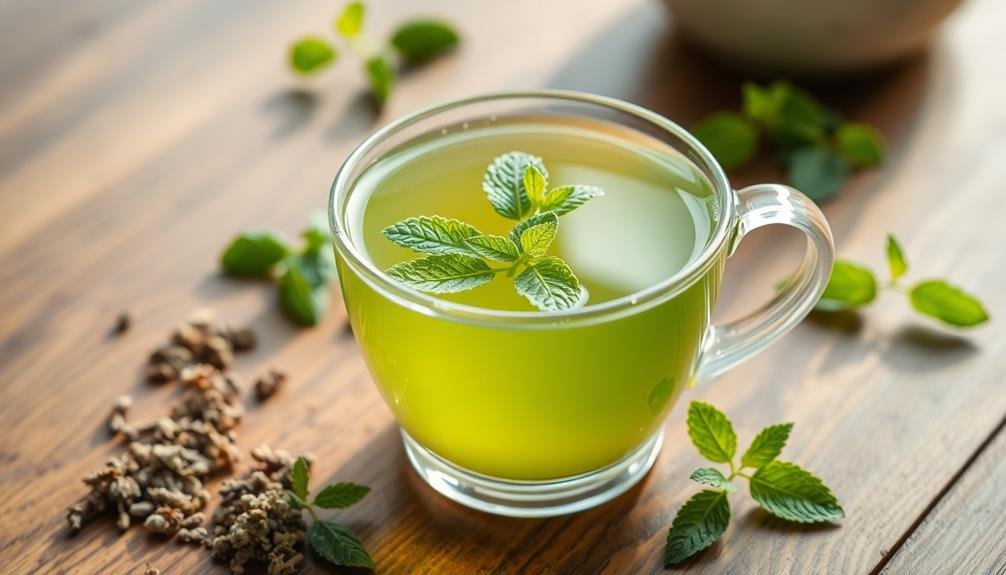
For an invigorating and mentally stimulating herbal tea, try combining peppermint with gotu kola. This blend offers a revitalizing taste and potential cognitive benefits. Peppermint is known for its ability to improve focus and mental clarity, while gotu kola has been used traditionally to enhance memory and reduce anxiety.
To prepare this infusion, you'll need equal parts dried peppermint leaves and gotu kola herb. Use about 1 teaspoon of each per cup of hot water. Steep the herbs for 5-7 minutes, then strain and enjoy. You can adjust the ratio to suit your taste preferences.
The cooling properties of peppermint complement gotu kola's earthy flavor, creating a balanced and pleasant drink. This combination may help improve concentration, reduce mental fatigue, and promote overall brain health. It's an excellent choice for studying, working on complex tasks, or when you need a mental boost.
Remember that while herbal teas can offer potential benefits, they're not a substitute for medical advice. If you're pregnant, nursing, or taking medications, consult your healthcare provider before consuming gotu kola, as it may interact with certain drugs.
Lemon Balm and Bacopa Mix
While peppermint and gotu kola offer mental stimulation, lemon balm and bacopa create a calming yet cognitively enhancing blend. This combination is perfect for those seeking to reduce anxiety while improving memory and focus.
Lemon balm, known for its soothing properties, helps alleviate stress and promote relaxation. Bacopa, an Ayurvedic herb, has been shown to enhance cognitive function and support brain health.
To craft this blend, you'll need equal parts dried lemon balm and bacopa leaves. Steep a teaspoon of the mixture in hot water for 5-7 minutes, then strain and enjoy. For best results, consume this tea regularly, as bacopa's benefits are cumulative over time.
Here are some key benefits of this lemon balm and bacopa mix:
- Reduces anxiety and stress
- Improves memory and cognitive function
- Enhances focus and concentration
- Supports overall brain health
- Promotes a sense of calm and well-being
Green Tea and Ashwagandha Combination
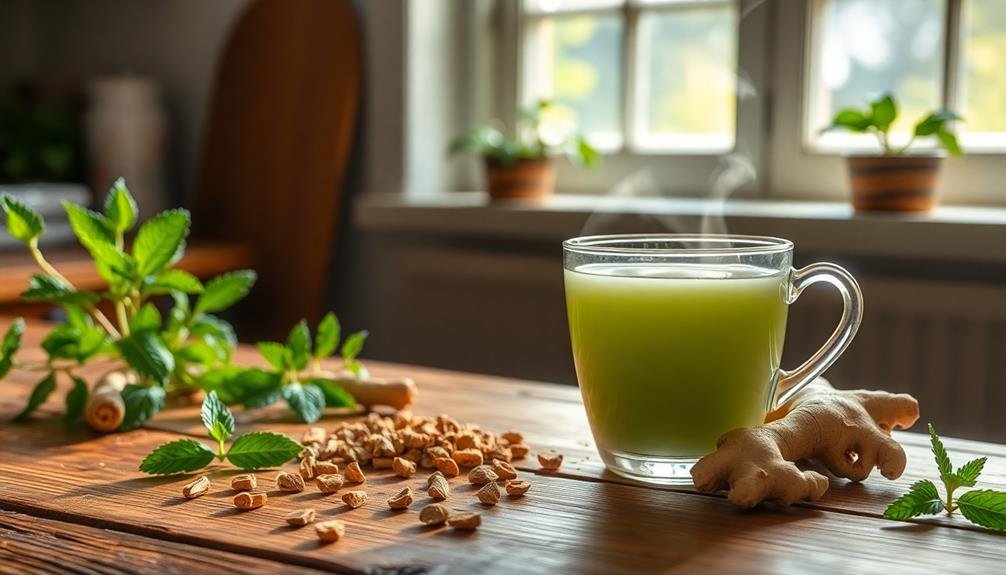
You'll discover a powerful duo for mental clarity in the green tea and ashwagandha combination.
This blend offers cognitive benefits and stress-reducing properties, but you'll need to know the proper preparation and dosage for ideal results.
While generally safe, you should be aware of potential side effects, especially if you're sensitive to caffeine or have certain medical conditions.
Benefits for Mental Clarity
The combination of green tea and ashwagandha offers a powerful boost to mental clarity and cognitive function. When you blend these two potent herbs, you're creating a synergistic effect that can enhance your mental acuity and focus.
Green tea's L-theanine promotes relaxation without drowsiness, while its caffeine content provides a gentle energy boost. Ashwagandha, an adaptogenic herb, helps reduce stress and anxiety, allowing your mind to function more efficiently.
By regularly consuming this blend, you'll likely experience:
- Improved concentration and memory
- Reduced mental fatigue
- Enhanced ability to multitask
- Increased resilience to stress
- Better overall cognitive performance
To maximize the benefits, brew your green tea and ashwagandha blend using water just below boiling point. Steep for 3-5 minutes, then strain and enjoy.
You can drink this blend in the morning to kickstart your day or in the afternoon to combat the post-lunch slump. Remember, consistency is key – incorporate this blend into your daily routine to experience its full potential for mental clarity and cognitive enhancement.
Preparation and Dosage
Now that we've explored the benefits of combining green tea and ashwagandha for mental clarity, let's focus on how to prepare this powerful blend and determine the right dosage. To create your own green tea and ashwagandha blend, you'll need high-quality loose-leaf green tea and ashwagandha powder or root.
Start by steeping 1-2 teaspoons of green tea leaves in 8 ounces of hot water (175°F) for 2-3 minutes. Then, add 1/4 to 1/2 teaspoon of ashwagandha powder or 1 teaspoon of dried ashwagandha root. Let it steep for an additional 5 minutes before straining.
For best results, consume this blend 1-2 times daily. It's best to start with a lower dosage and gradually increase it as needed. Here's a quick reference guide for preparation and dosage:
| Ingredient | Amount | Steeping Time |
|---|---|---|
| Green Tea | 1-2 tsp | 2-3 minutes |
| Ashwagandha Powder | 1/4-1/2 tsp | 5 minutes |
| Ashwagandha Root | 1 tsp | 5 minutes |
| Water | 8 oz | – |
Remember to consult with a healthcare professional before incorporating new herbal supplements into your routine, especially if you have any pre-existing medical conditions or are taking medications.
Potential Side Effects
While combining green tea and ashwagandha offers numerous benefits, it's important to be aware of potential side effects. Both herbs are generally safe for most people, but some individuals may experience adverse reactions, especially when consumed in large quantities or over extended periods.
You should be cautious if you're pregnant, breastfeeding, or have certain medical conditions. Green tea contains caffeine, which can cause jitters, anxiety, and sleep disturbances in sensitive individuals. Ashwagandha may interact with medications for thyroid disorders, diabetes, or autoimmune diseases.
Common side effects to watch out for include:
- Stomach upset or nausea
- Headaches or dizziness
- Increased heart rate
- Dry mouth
- Skin rashes or allergic reactions
If you experience any of these symptoms, reduce your intake or discontinue use. It's always best to consult with a healthcare professional before adding new herbal supplements to your routine, especially if you have pre-existing health conditions or are taking medications.
Start with small amounts and gradually increase to assess your tolerance. Remember, everyone's body reacts differently, so listen to yours and adjust accordingly.
Brewing Techniques for Maximum Potency
To maximize the potency of your herbal tea blends, you'll need to master the art of brewing.
Pay close attention to steeping time and temperature, as these factors greatly influence the extraction of beneficial compounds.
Once brewed, proper straining and storage methods will help preserve the tea's potency and flavor for longer periods.
Steeping Time and Temperature
Achieving the perfect cup of herbal tea involves mastering the art of steeping time and temperature. Each herb has its ideal steeping conditions, so it's essential to understand these nuances for peak flavor and potency.
Generally, delicate herbs like chamomile and mint require lower temperatures and shorter steeping times, while robust herbs like ginger and cinnamon can withstand higher temperatures and longer steeps.
For most herbal teas, aim for water temperatures between 190°F and 212°F (88°C to 100°C). Steep times typically range from 5 to 15 minutes, depending on the herb and desired strength. To guarantee consistency, use a timer and a thermometer when brewing your blends.
Here are key points to remember:
- Use cooler water (180°F/82°C) for delicate herbs
- Steep robust herbs in boiling water (212°F/100°C)
- Longer steeping times increase potency but may introduce bitterness
- Experiment with different times and temperatures to find your preferred taste
- Cover your tea while steeping to retain heat and volatile compounds
Straining and Storage Methods
Two critical steps in brewing herbal tea for maximum potency are straining and proper storage. After steeping, you'll want to strain your tea to remove the plant material. Use a fine-mesh strainer or cheesecloth to catch even the smallest particles, ensuring a smooth, debris-free beverage.
For maximum potency, gently press the herbs to extract any remaining essence.
Store your brewed tea properly to maintain its potency and freshness. If you plan to drink it within a day, keep it in a covered glass container in the refrigerator. For longer storage, transfer the cooled tea to an airtight glass bottle and refrigerate for up to three days.
Don't use plastic containers, as they can leach chemicals and affect the tea's flavor.
For dry herb blends, store them in airtight glass jars away from light, heat, and moisture. Keep each blend separate to prevent flavors from mixing. Label your jars with the blend name and date of creation.
Properly stored, dry herbal blends can maintain their potency for up to six months. Always check for any signs of mold or unusual odors before use.
Proper Storage of Herbal Blends
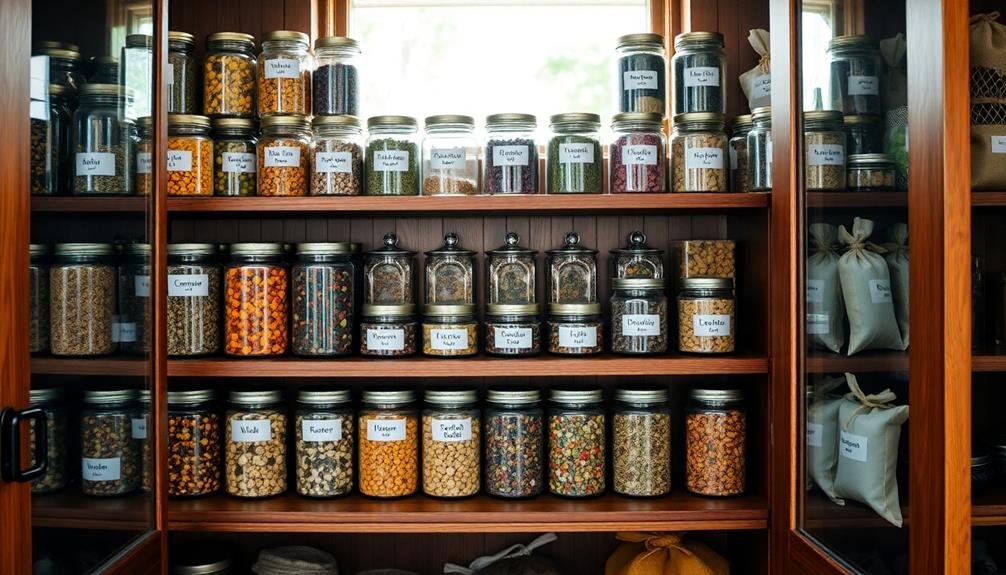
Proper storage is essential for maintaining the quality and potency of your herbal tea blends. You'll want to keep your herbs away from light, heat, and moisture to preserve their flavor and medicinal properties.
Choose airtight containers made of glass or ceramic, as these materials won't impart any unwanted flavors or odors to your blends.
Store your herbal tea blends in a cool, dark place like a pantry or cupboard. Avoid keeping them near heat sources such as stoves or radiators.
If you live in a humid climate, consider using silica gel packets in your storage containers to absorb excess moisture.
Label your containers with the blend name and date of creation. This will help you keep track of freshness and guarantee you use older blends first.
Most herbal tea blends will stay fresh for 6-12 months when stored properly.
- Use airtight glass or ceramic containers
- Store in a cool, dark place
- Keep away from heat and moisture
- Label with blend name and date
- Use silica gel packets in humid climates
Incorporating Tea Into Daily Routine
Now that you've mastered storing your herbal tea blends, let's focus on making them a regular part of your day. Start by identifying key moments when you can enjoy your tea. Morning rituals are perfect for energizing blends with ingredients like ginkgo or ginseng. Mid-afternoon slumps call for mood-boosting herbs such as lemon balm or St. John's wort.
Set reminders on your phone or place tea sachets in visible spots as cues. Keep a thermos of your favorite blend at work or in your car for easy access. Experiment with iced versions of your teas for invigorating summer drinks. Try replacing one coffee or soda with a herbal tea each day to gradually build the habit.
Pair your tea moments with other activities you enjoy, like reading, meditation, or light stretching. This creates positive associations and encourages consistency.
Don't forget to track how different blends affect your mood and cognition. Keep a journal to note which combinations work best for various situations. As you incorporate these mind-enhancing teas into your routine, you'll likely notice improvements in focus, clarity, and overall well-being.
Frequently Asked Questions
Are There Any Potential Side Effects of Consuming Mind-Enhancing Herbal Teas Regularly?
You should be aware of potential side effects from regular herbal tea consumption. These may include headaches, insomnia, digestive issues, or interactions with medications. It's best to consult a healthcare professional before making them a daily habit.
Can Pregnant Women Safely Drink These Herbal Tea Blends?
You shouldn't drink herbal teas while pregnant without consulting your doctor first. Some herbs can be harmful to your baby. It's best to stick with pregnancy-safe teas or get professional advice before trying any new blends.
How Long Does It Take to Notice Cognitive Benefits From These Teas?
You'll likely notice subtle effects within 30 minutes of drinking these teas. However, for significant cognitive benefits, you'll need to consume them regularly over several weeks. Individual results may vary based on your body's response.
Are There Any Drug Interactions to Be Aware of With These Herbs?
You should be cautious about potential drug interactions with herbal teas. They can affect medication absorption or efficacy. Always consult your doctor or pharmacist before using herbal remedies, especially if you're taking prescription drugs or have health conditions.
Can Children Consume These Mind-Enhancing Herbal Tea Blends?
You shouldn't give mind-enhancing herbal teas to children without consulting a pediatrician. Their developing bodies may react differently to herbs than adults. It's best to stick to child-safe, caffeine-free herbal teas for kids instead.
In Summary
You've now got the knowledge to craft your own mind-enhancing herbal tea blends. By combining powerful herbs like ginkgo biloba, rosemary, and ashwagandha, you're creating potent brews that can boost your cognitive function. Remember to use proper brewing techniques and store your blends correctly to maintain their efficacy. Make these teas part of your daily routine, and you'll likely notice improvements in focus, memory, and mental clarity. Enjoy your homemade brain-boosting beverages!

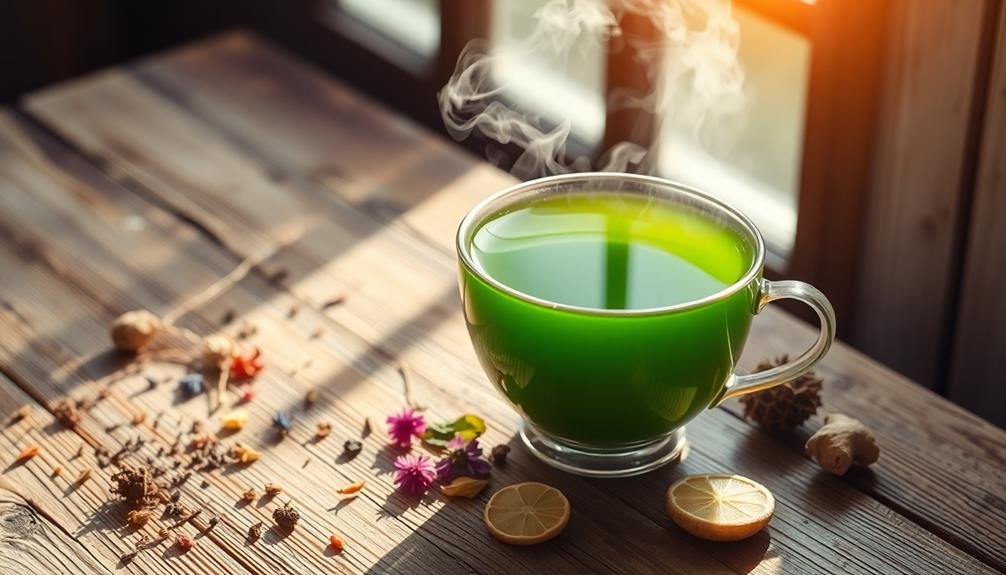



Leave a Reply